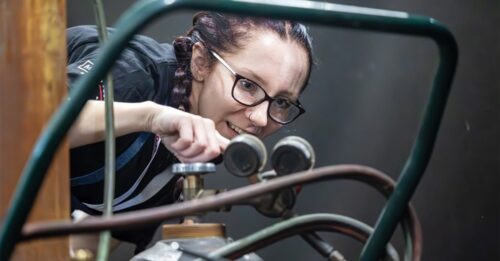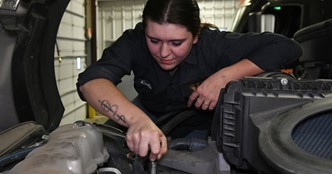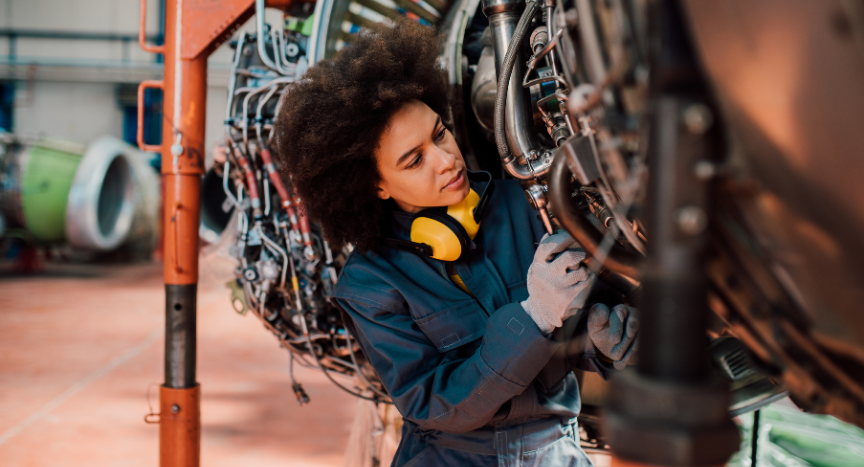The commercial freight transportation industry, whether private fleets or for-hire corporations, continues to face a significant gender gap in its workforce. According to data from the 2024-25 Women in Trucking (WIT) Index, the percentage of female diesel technicians and mechanics remains staggeringly low. The WIT Index, a benchmark tool from the Women in Trucking Association (WIT), tracks annual progress in the representation of women across critical roles in the transportation sector.
Shockingly, only 4% of all diesel technician roles are occupied by women, based on the latest findings. This figure is particularly notable since tracking female representation in these positions only began in 2022.
Why Diesel Technicians Matter to the Industry
Diesel technicians and mechanics play an integral role in ensuring the seamless operation of the trucking industry. Without them, professional drivers would struggle to deliver goods when trucks are sidelined due to mechanical failures, from engine aftertreatment issues to faulty brakes.
The U.S. Bureau of Labor Statistics reports there are approximately 242,200 diesel technicians employed nationwide. However, the demand for these professionals far exceeds the current supply. The American Trucking Associations (ATA) estimates that an additional 200,000 technicians will be required over the next decade to meet burgeoning maintenance demands. Compounding this issue is the fact that U.S. technical schools are currently training only about 3,500 new diesel technicians annually.
“There’s a severe shortage of diesel technicians in the trucking industry, and women can play a key role in addressing this gap,” says Jennifer Hedrick, WIT President and CEO. “The WIT Foundation provides scholarships to women seeking training in this area as well, and we place significant efforts into promoting this potential career option to women.”
Women Thriving as Diesel Technicians
For women, breaking into the traditionally male-dominated field of diesel mechanics can seem intimidating. Yet many who enter the profession thrive, displaying technical skills, determination, and a passion for their work.
Take Alyssa Briggs, for example.
Alyssa, in her mid-20s, is excelling in her role as a trailer mechanic at XPO, a career she embarked on four years ago. Her introduction to the field was anything but conventional. Initially unsure about her career path, she enrolled in a diesel mechanic course despite having no prior mechanical experience—her closest exposure to the field had been watching her stepfather change a car’s oil.

On her first day of school, she quickly realized she was the only woman in the class, which made her even more nervous. But to her surprise, the men were quick to help with her questions and shared a wealth of useful knowledge. As time passed, her love for mechanics grew, and the more she learned, the more fascinated she became.
Her growing interest in mechanics led her to secure a position at XPO after graduation. “I remember asking the interviewer if the company had ever employed a woman mechanic and to my surprise, he responded with, ‘we actually have two other great women mechanics here.’ I couldn’t believe it and hearing that helped ease my nerves going into this field – I wasn’t alone!” Briggs accepted a job offer, and four years later, she’s thriving in her career.
Keelie Boyer, at just 20 years old, is another inspiring example of a young woman making her mark in the field.
Working as a truck maintenance and prep technician for Wilson Logistics, Keelie’s career began with a childhood fascination for mechanical work she picked up while helping her dad fix cars and her grandpa work on tractors.

“Wilson Logistics has trained me on a lot of things I never knew about trucking and, in this career you are never done learning,” she continues. “You never know everything you’re going to learn – especially when it comes to changes in electronics in trucks. It’s fun because you’re learning all the time.”
Her responsibilities at Wilson Logistics range from prepping trucks for drivers to completing Department of Transportation-compliant inspections. “We help to keep our drivers excited about their jobs from the time they open the door and see that everything is clean, shiny and working perfectly.”
Keelie’s advice for women exploring this career path? “If you are younger and you think this is something you may want to do, take an automotive class in school,” she advises. “Gain basic knowledge of vehicles, but realize you don’t need to understand cars and trucks when you first start out because your shop is going to train you,” she says. “Also be ready to stand up for yourself, be willing to listen and learn, be open to take advice from other guys in the shop, be ready to lift heavy things and work safely.”
Encouraging Women to Close the Gap
With diesel mechanics in high demand, leveraging untapped talent pools, such as women, is essential for the future of the trucking industry. Women not only bring technical competence to the table, but they also offer fresh perspectives and renewed enthusiasm to an industry facing workforce shortages.
Efforts like the WIT Foundation’s scholarship program play a pivotal role in encouraging more women to enter the field. Promoting these career paths and creating a supportive work environment can pave the way for greater gender diversity and help close the technician gap.
Women like Alyssa Briggs and Keelie Boyer demonstrate that not only is there room for women in the field of diesel mechanics, but they can also excel and find fulfillment in these roles. Organizations should continue to invest in initiatives aimed at diversifying their workforce by creating opportunities and empowering women to explore nontraditional career options.
The Time for Change is Now
For women considering this career path, know that success doesn’t require prior experience with cars or trucks. What you need is the willingness to learn, the determination to thrive, and the courage to step into a role where you can make a real impact.
Will you be the next trailblazer shaping the future of diesel technology?
Source: Women In Trucking











